Amy Shark: ‘I don’t have any fear’
Her lyrics are typically raw and direct. But what is it about Amy Shark’s new song that left her Sony boss in tears?
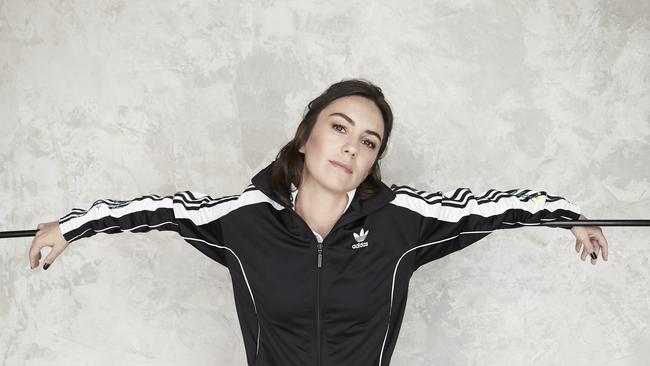
On an overcast Wednesday afternoon in early April, the only shark sighting on Sydney Harbour is the barefoot thrill-seeker in the front row of a yellow jet boat, white-knuckle hands gripping the safety rail for dear life. Amy Shark is one of two dozen purple poncho-clad passengers gasping and grinning like giddy kids as the driver executes another 360-degree turn, sending buckets of saltwater raining down. Halfway through the high-speed whip around the famous harbour of the city she has only recently called home, the artist, whose driver’s licence reads Amy Billings, wipes her eyes. The boat ride was her idea, intended as a refreshing tonic ahead of a packed schedule of Zoom calls with media here and abroad, but she didn’t expect us to get quite so wet. “I’m sorry,” she says. “We should have gone fishing.”
The day started in a much calmer and more controlled setting, with one woman and her Martin acoustic guitar reaching across oceans to her fans in Los Angeles as part of a six-date “digital tour” of the US, live-streamed from the recording studio at her label’s inner-city office. “Thank you for tuning in to my living room acoustic, very chilled-out session today,” she said, looking down the barrel of the camera. Dressed down in a loose blue jumper and jeans torn at the knees, Shark, 34, worked through eight tracks in 40 minutes, telling stories and smiling at the three record label staff in the room who applauded each song in an attempt to cut through the unavoidable awkwardness; we’ve learnt over the past year that watching on a screen is often a poor substitute for live music.
Shark selected four singles from her upcoming second album Cry Forever as well as four tracks from her chart-topping debut Love Monster, which won album of the year at the 2018 ARIA Awards alongside two other trophies. Scrubbed of the electronic beats and atmospherics that define her distinctive pop sound, this stripped-back performance offered viewers the chance to see the artist playing these songs as they were written, with only her voice and a guitar. “This one definitely showcases a dark part of this new album,” she said to the camera while introducing All the Lies About Me. “I love it, because any time I feel a little lost or misunderstood, I write a song and I feel good again. So I’ve kind of unloaded all my shit onto you guys. Once this album’s out, it’s going to feel so good: I’m just going to go and frolic in the fields, and you guys can deal with all my issues, and take them on yourself.”
A smile danced across her face as she said this but there was clearly truth behind the sentiment, for since she arrived on the national stage a few years ago her songwriting has only ever come across as unusually direct. Where many pop performers attempt to create some distance between their true selves and the perspective they’re singing from, or vocalise words written for them by other people, Shark’s songs are heavy with detail and wrapped in her feelings and memories.
Her newest single, for instance, came out of a simple query from her co-writer Ed Sheeran, the global chart-topping British artist who wondered whether she ever wrote love songs for her husband. Her response became the title: Love Songs Ain’t For Us. In the studio, Sheeran challenged her to sing it in a higher register than she was used to, and country musician Keith Urban joined her in a duet on the record, although she found a cute way to simultaneously humble-brag and downplay her relationship with these two famous collaborators by noting their distinct absence from the digital show. “Is he playing golf or something?” she said of Urban. “What could be more important than this live-stream today?”
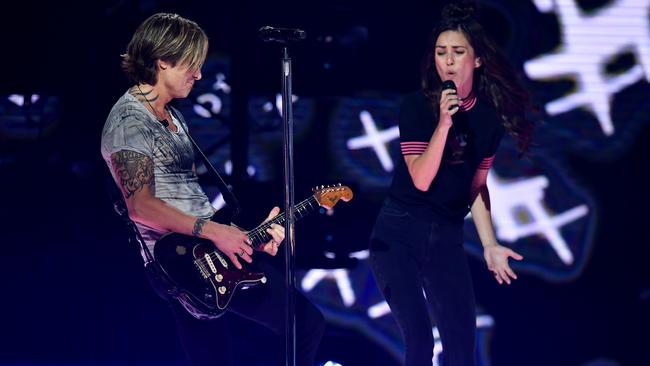
The four songs she played at the mini-gig had all been previously released; set opener Everybody Rise was recently nominated for song of the year at the APRA Music Awards, marking the fourth time in five years her musical peers have picked her for the top award. Omitted from her broadcast, however, was the most devastatingly frank and vulnerable song of her career, which she chose to keep up her sleeve and which we’ll get to later. Strangely enough, the raw, direct tune is titled Amy Shark, and at this point in time very few people had heard it. (When Sony Music boss Denis Handlin first heard it, “I just broke down and lost it.”) Three weeks out from the release of Cry Forever, she is keeping it concealed like a switchblade.
Towards the end of her set, a fan watching in Los Angeles asked how she chose the name of her new album. “I started writing it the second I finished Love Monster; any time I was feeling a hypersensitive moment, I would always try and write about it,” she replied. “Funnily enough, I’d never cried so much in my life since being a musician, whether it was happy tears, lonely tears, confused tears, overwhelmed tears, just plain tired tears – or I’m just hungry.
“I was talking to someone really close to me, and I was apologising for being so emotional,” she said, referring to her husband. “He was like, ‘This isn’t going to stop; you’ve got this life, and it’s probably going to get harder. So just keep crying; cry forever if you have to.’ I thought that sounded cool. If I get to play music for the rest of my life, I’m happy to cry,” she said with a laugh. “It’s all good.”
Some music careers appear to have been fated from childhood. You’ve heard this story before: a talented young performer is plucked from obscurity, signed early to a development deal and given every chance and resource to rise to their full potential before entering the industry as a fully fledged, media-trained phenomenon. Watch the sales, cash and awards pile up.
Shark’s story is nothing like that. For the longest time it seemed the chance of her making a living from playing her songs to other people was slim to none. Born in 1986 and raised on the Gold Coast, her slow climb up the greasy ladder of Australian pop music has been hampered by continual rejection, and it’s taken pure grit to stick it out. Like so many before her, she had a dream – it’s just that few others were willing to close their eyes and hear what she heard.
For quite a few years, only one other person shared that dream. His name is Shane Billings, and she married him in 2013; since early 2019, he has managed the Australian side of her career. They met in their late teens, when they were both in other relationships, and were friends well before they became partners, but they shared a deep love of music. Shane was the one who told her that her songs were too good to stay in their room, for his ears only. He set up her MySpace page in 2007, when she performed as Amy Cushway, and pushed her to continue writing songs when she was making decent money playing acoustic covers at corporate gigs as a sideline to their day jobs at the Gold Coast Titans rugby league club. Shane was the chief financial officer and she worked on the club’s indigenous community program.
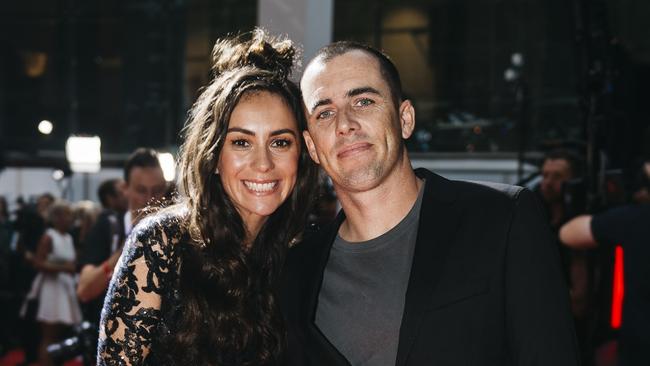
Thinking back to those after-hours covers gigs, where the likes of Crowded House, Mumford & Sons, Norah Jones and other easy listening fare were her bread and butter, Shark tells me: “I didn’t want people looking at me; I just wanted to make the money. I was like, ‘Don’t put any lights on me. I’m happy to do the gig, and I’ll do it well.’ I didn’t care about what I was singing, but I enjoyed playing guitar and I thought, ‘Wow, this is so cool to do this and get $400.’ I was just background music, and it was easy.”
As any pub busker will tell you, performing a repertoire of crowd-pleasing pop standards is straightforward enough; building an audience for original music is a much steeper climb. Even with a true believer like Shane pitching her self-funded CDs and hassling bookers for any opportunities outside the Gold Coast – including driving up the highway for sparsely attended midweek support slots at small Brisbane venues for little money – there was little outward indication that her career was going anywhere other than playing Don’t Dream It’s Over for the 500th time tucked away in the dim corner of yet another function room. Nevertheless, she persisted, exhibiting the sort of crazy-brave self-belief that’s only brave in hindsight, once an artist breaks through – otherwise it just looks crazy.
When she made the switch from Amy Cushway to Amy Shark around 2014, it was a rare chance for a fresh start with a new public name. “I love that I get to do that,” she says. “With my music in particular, I don’t want to feel like I’m second-guessing it. I don’t want any fear, and I don’t have any fear when I’m Amy Shark. I’m not dragging a family name down; no one can give me any shit because this is my business, and this is what I do. It’s nice to just have another life; another name.”
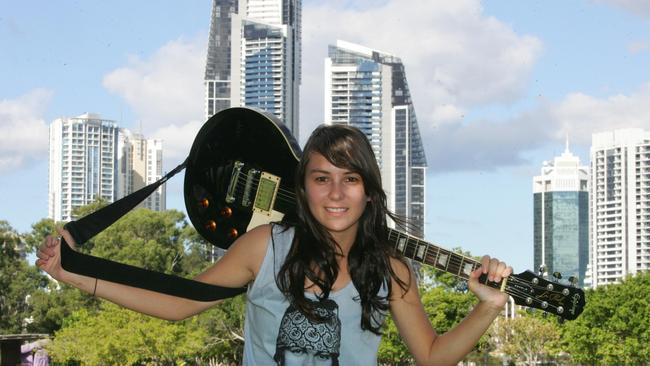
Is the stage name a mask, a suit of armour or somewhere in between? “When I’m writing, I can kind of compartmentalise my life. How do I say this? I just didn’t want my family involved,” she replies with a laugh. “I’ve had a couple of names in my life; I’ve changed my last name a couple of times before I was married, even. And everyone who knows me knows I’ve been obsessed with sharks since I was in primary school.”
To many, Amy Shark emerged fully formed as an unsigned artist nearly five years ago when her song Adore was released in July 2016. A stark, sweet play-by-play of a night out while falling in love, it was added to Triple J’s national radio playlist, then later crossed over to commercial radio. Re-released in November after Shark had signed with Sony Music, the track reached No 3 on the ARIA singles chart and polled at No 2 in Triple J’s Hottest 100 the following year.
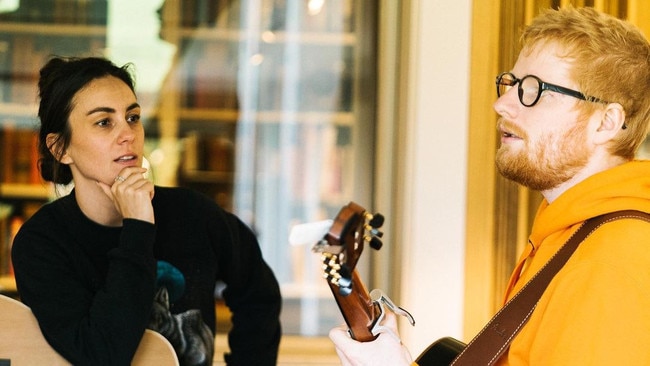
Then came the Night Thinker EP, which charted No 2 in May 2017, followed by shows to much larger crowds here and overseas, backed by a live band featuring multi-instrumentalist Brad Hosking and drummer Joe Malafu. In 2018 she released what would become her signature song, I Said Hi, a multi-platinum modern pop classic in the form of a pointed middle finger to those in the music industry who dismissed her aspirations as a younger artist. Since the debut album Love Monster it’s been a steady ascent, aside from the pandemic putting a pin in her plan to base herself in Los Angeles to have a proper crack at the US market; she and Shane settled in Sydney in August last year instead.
After years of hiding away playing other people’s songs, Shark now stands under bright lights on some of the nation’s biggest stages with plenty of eyes on her, as the tracksuit-clad singer with the most distinctive Australian top knot this side of Chris Hemsworth’s Thor.
What kept her going through all those shitty nights playing to unreceptive crowds on the Gold Coast pub circuit? “I love it,” she says of her long dreamed-for life in music. “I have already won, so I’ve got nothing else to prove. If it all stopped tomorrow, I’ve proven myself. I write songs and they get heard now.”
After the jet boat ride, we take a seat at a bar near the Sydney Opera House to decompress over a beer. Moments later, an observant young woman politely interrupts: “Are you Amy Shark?” A little waterlogged and wearing sunglasses, the pop star agrees to a quick selfie. Absent throughout the past few hours has been any discussion of the song-shaped switchblade that Shark will soon slip between the ribs of some of those who knew her long before she was one of the nation’s most popular artists.
The 13th and final track of her new album is titled Amy Shark. Wrapped in its three-minute runtime is a sharply drawn autobiographical sketch of the sweep of her life, from her earliest memories to the seemingly sudden rise to prominence. Set to a lullaby-like descending guitar phase and a choir of her own backing vocals, it tells the story of a girl who grew up in a small house near a cemetery who could “hear them howl as they lower the ones they love in the ground”. While training the watchful eye of one who would later write songs taken from the pages of her own life, that girl didn’t miss much, but she did miss the stable presence of her biological father, who split from her mother when Amy was a toddler:
And you should see the shows I’ve played / And hear them sing the words I say / I wonder sometimes if you’re in the crowd / ‘Cause I needed help / I needed love / I needed care / I needed a hug / I needed praise / I needed time with you
Asked about its origins, Shark’s chipper mood starts to falter as she attempts to articulate what’s clearly a challenging subject. “It started about something specific – or someone specific – and then it just grew into this big beast,” she says. “I’m at a stage now where I can actually reflect quite easily, and put it together calmly and into a song.”
First written as a poem addressing the hurt of her abandonment, its scope grew to include the costs of her dream. In its chorus, her vocals intentionally eschew the established metre as her words pour out with urgency across bars:
And I still lose it every now and then / In an interview or a photo shoot / I could be halfway through a show and it all comes creeping in / And I’ve sacrificed all my friends / Birthdays, weddings, everything / And it’s heartbreaking, but this is my dream / And I did it all without a phone call or a Christmas card / You have no heart / This is my way of saying “Don’t start”
“This song is the peak of who I am as an artist: telling stories, putting them into melody and not holding back,” she says. “And being brutally honest about really difficult things, and being strong enough that I’m not weak about it.”
When Shark played the song to the boss of her record label for the first time, its potency was undeniable. “She’s crying, I’m crying; oh, f..k mate, we were a mess,” says Denis Handlin, the Sony Music chairman and chief executive. “I felt sad for her. I was very fortunate to grow up with a lot of love in our family. Probably the greatest gift my father ever gave to me and my brothers and sisters was just how much he loved my mum. That’s the parent you want to be, too.”
Don’t start now I’m winning / And finally happy / Don’t start now I’ve done all the years of hard work / Don’t start taking over and asking for favours / Please just don’t start now that I’m Amy Shark.
“It’s a ballsy thing to do, and she’s going to psych herself up to do that [song] live,” says Handlin. “I think it’ll be such a moment, because a lot of people can relate to that too, big time. It’s so powerful, and I think because of the honesty of her storytelling, I think her respect will go to another level. You’ve got to be pretty brave to put that out there.”
As we sit at the Opera House bar picking over the song, Shark is guarded as she folds and wrings a beer coaster between her hands. But on August 27, 2017, she wrote on Twitter, “Haven’t heard from my father in 15 yrs until now. It must suck knowing ur daughter got all this way on her very own! Now beat it! I’m busy.” Asked about this tweet and its connection to the song, she opens up a little. “I definitely don’t talk to my dad,” she says. “I’m not sad about it; I’m just living my life now. I’m not saying forever, [that] I won’t ever talk to him – but right now I don’t, and unfortunately there were plenty of years to fix that. And it wasn’t at the top of our list. I’m busy now.”
Shark looks up with a slight smile and says: “Cat’s in the Cradle.” It’s the title of the 1974 hit by US folk-rock artist Harry Chapin. In the moment this reference passes me by, but after Shark slips away into the Sydney Harbour twilight I revisit Chapin’s song. Its lyrics centre on a strained relationship that never quite reconciles; a father too busy with travelling for work to engage with his son. “When you comin’ home, Dad?” / I don’t know when / But we’ll get together then / You know we’ll have a good time then. The sting in the tail arrives when the roles reverse: the father retires and asks to see his son, only to be rebuffed with the same casual rejection. And as I hung up the phone it occurred to me / He’d grown up just like me / My boy was just like me.
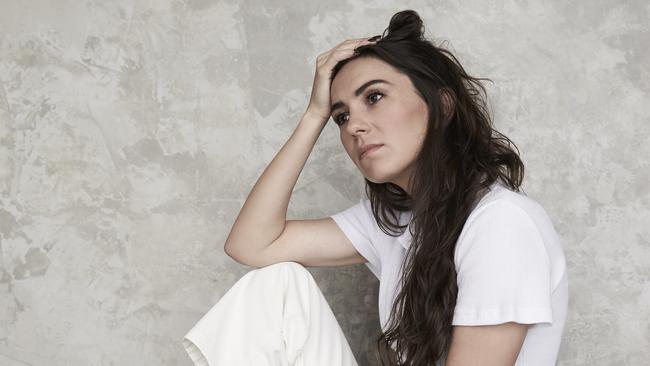
It’s an apt reference for Shark, who grew up immersed in the diverse record collection of her mother and the stepfather she came to call “dad”; later she’d broaden her musical horizons while working at an HMV record store. The final track on her second album contains echoes of the strained father-child dynamic that Chapin expertly explored almost five decades earlier. Its haunting arrangement and melody marry deep pain and grief with hard-earned self-belief and pride for her achievements despite what she lost as a child.
“This is my story; so many kids have had it way worse,” she’d said earlier, working her way towards a note of defiance. “I had a sort of great childhood, and there were other people in my life who made that happen. But the song is about when your life changes. That’s the hard bit, to see these people come back. It’s really weird. Not many people get to experience that, ever. You never know how you’re going to take it, really, because you never think you’re ever going to become someone in music – until you are.”
Viewed another way, perhaps that loss fuelled her determination. Maybe if she’d had it a little easier, and if her family structure had been a little more traditional, she might not have been as driven to prove herself in an industry that can chew up and spit out all but the most dogged individuals. Hers is not one of those stories.
Cry Forever (Sony Music) is out now. Amy Shark’s national tour begins in Sydney (June 12) and ends in Perth (July 3).


To join the conversation, please log in. Don't have an account? Register
Join the conversation, you are commenting as Logout